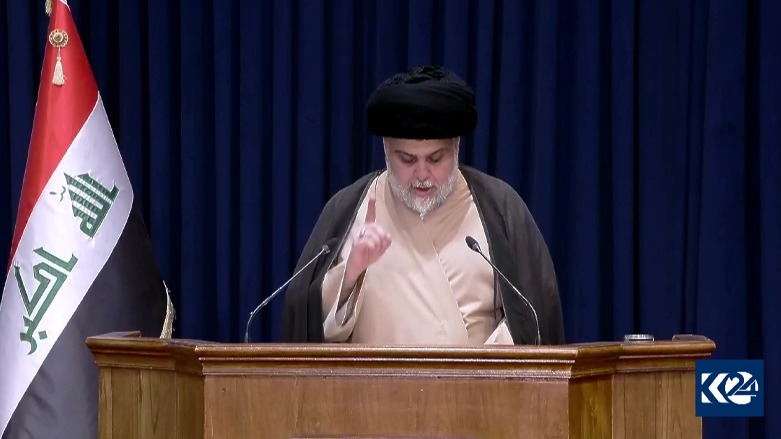Muqtada al-Sadr and Iraq’s Next Elections: A Strategic Return or Tactical Absence?
Observers suggest that if the elections proceed with a multi-district system, the Sadrist movement could secure over 100 parliamentary seats, significantly reshaping Iraq’s political landscape.

ERBIL (Kurdistan24) – With Iraq’s parliamentary elections scheduled for October this year, significant challenges loom over the electoral process, particularly the participation of Muqtada al-Sadr’s movement and ongoing debates over the country’s election law.
Despite the Independent High Electoral Commission’s preparations for the vote, legal disputes and political uncertainties remain at the forefront. One of the key issues under contention is the electoral law, particularly the use of the Sainte-Laguë system for seat allocation. Several political factions have called for amendments to the voting process, demanding a review of the system to ensure a fairer distribution of parliamentary seats.
Another major point of concern is the potential participation of the Shiite nationalist movement led by Muqtada al-Sadr. While the movement has yet to officially announce its stance on whether it will contest or boycott the elections, sources from Sadr’s headquarters in Hanana have remained silent on the matter. Observers suggest that if the elections proceed with a multi-district system, the Sadrist movement could secure over 100 parliamentary seats, significantly reshaping Iraq’s political landscape.
A senior figure within the Sadrist movement recently told Iraqi media that any decision regarding their return to the political arena would require Muqtada al-Sadr’s explicit approval. However, he stressed that a return does not necessarily mean aligning with the Coordination Framework, the rival Shiite political alliance currently leading the government. While Sadr has made it clear that he will not form a partnership with the Coordination Framework, he remains open to cooperating with certain factions within the bloc as part of his vision for a nationalist-majority government.
Iran’s Influence and the Future of Iraq’s Political Landscape
Meanwhile, political analyst Rafid Atwani believes that Iran has a vested interest in maintaining Shiite dominance in Iraq’s political system, and therefore seeks to unify Shiite factions under Sadr’s leadership. "Iran has a strategic plan for Iraq and aims to consolidate Shiite political forces under Sadr’s authority to preserve the Shiite identity and maintain their influence over Iraq’s governance," Atwani explained.
He further noted that Sadr is well-positioned to fill the political vacuum left by Iran’s shifting role in Iraq, and should the elections proceed under a multi-district voting system, the Sadrist movement could emerge as a dominant force in the next parliament.
Iraq’s Political Volatility and Electoral Challenges
Iraq’s electoral landscape has remained turbulent since the last parliamentary elections, marked by political infighting, government deadlock, and mass protests against corruption and foreign influence. The Coordination Framework, a coalition of Shiite parties backed by Iran, currently holds the majority in parliament but faces ongoing challenges from nationalist and independent factions.
Muqtada al-Sadr, a key figure in Iraq’s political scene, has previously withdrawn from the electoral process, yet his influence remains a determining factor in shaping Iraq’s future governance. His movement’s potential return could dramatically alter the balance of power, making the upcoming elections a critical turning point for the country’s stability and political trajectory.